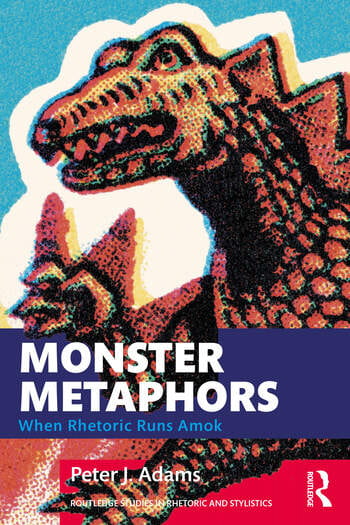Peter J. Adams Book Description
Monster Metaphors: When Rhetoric Runs Amok
New York: Routledge, 2023 (252 pages) ISBN: 9781032122106, 9781003223580
Content
This book explores ways in which common metaphors can play a detrimental role in everyday life; how they can grow in outsized importance to dominate their respective terrains and push out alternative perspectives; and how forms of resistance might act to contain their dominance. The volume begins by unpacking the dynamics of metaphors, their power and influence and the ways in which they are bolstered by other rhetorical devices. Adams draws on four case studies to illustrate their destructive impact when they eclipse other points of view—the metaphor of mental illness; the metaphor of free-flowing markets; the metaphor of the mind as a mirror and the metaphor of men as naturally superior. Taken together, these examples prompt further reflection on the beneficiaries of these “monster metaphors” and how they promote such metaphors to serve their own interests but also on ways forward for challenging their dominance, strategies for preventing their rise and ways of creating space for alternatives.
This book draws our attention to ‘monster metaphors’ that have gained illegitimate domination of discourse in certain domains, such that our conception of the field is dangerously narrowed […] The opening chapter tells an engaging story of how monster metaphors rampage over the discursive landscape, destroying rival metaphors at every turn. Chapter 2 reviews the main theories of metaphor and explains the author’s preference for seeing the connotations of one domain being ‘mapped’ on to another domain. Chapter 3 shows how major metaphors are buttressed by associated instances of synecdoche and metonymy that tie the metaphor into its context. Chapter 4 highlights the creative potential of metaphor for explaining complex topics and stimulating our imaginative faculties, and chapter 5 outlines how a metaphor ‘turns nasty’ and grows, like a cancer, to reign over the whole domain [,,,] Among the many strengths of the book are: the major social implications of the case studies; the breadth of the author’s knowledge of the fields he explores; the vivid stories he tells about the origins of each monster metaphor; the references to his personal experience (for instance, working in a traditional psychiatric hospital as an eighteen-year-old); the occasional humour; and the vividly engaging style with which it is written. Read full review
Michael Hanne, Language in Society, Volume 52(5), pp. 917-18
Overall, the book is knowledgeable, exciting, irritating, and also a political book. It is definitely worth reading.. Read full review
Jo Reichert, Forum: Qualitative Research, Volume 25(1).
